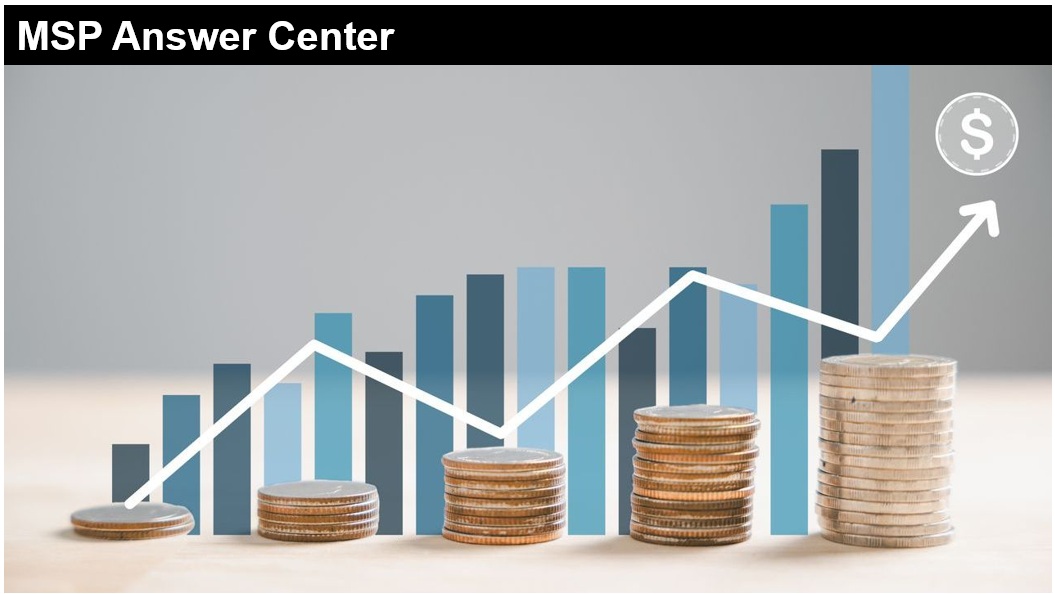Every MSP owner asks it eventually: How much is my business actually worth? Whether you’re planning to sell, merge, or just curious about what you’ve built, understanding your valuation isn’t just about a number. It’s about knowing what buyers look for, what drives value, and where your business stands today.
There’s no universal price tag for an MSP. Valuation depends on a variety of factors — some objective, some not — and the answer can shift based on who’s buying, how the deal is structured, and what your business looks like under the hood.
Multiples and Why They Matter to Your Valuation
When MSP owners talk valuation, the first thing you usually hear is “I want a 3/4/5x.” What they’re referring to is a multiple of EBITDA (Earnings Before Interest, Taxes, Depreciation, and Amortization). That’s the baseline number buyers often use to value service businesses like MSPs.
Here’s the basic formula:
- Valuation = EBITDA × Multiple
- So, if your EBITDA is $400,000 and you’re being offered a 3x multiple, your business is valued at $1.2 million.
Simple, right? Not quite.
Multiples aren’t fixed. They vary based on risk, growth potential, client concentration, contract structure, and dozens of other variables. A business with recurring revenue, clean books, and a documented process might get a 4x, 5x or more. One with a project-heavy income and inconsistent billing might struggle to reach 2x.
The point? Multiples are a starting point, not a promise.
What Actually Drives Your MSP’s Valuation
Here are the key elements that influence how much your business is worth in the eyes of a buyer:
- Recurring Revenue. This is the big one. Buyers love predictability. The more of your income that comes from monthly or annual service contracts, the stronger your valuation. Project work, hardware resale, and break-fix services just don’t carry the same weight.
- Client Diversity. If 30% of your revenue comes from one client, that’s a risk. A diversified client base reduces buyer anxiety and shows stability.
- Clean, Transparent Financials. Buyers want to see 2–3 years of organized financials. Bonus points if you’re on accrual accounting and can clearly separate owner compensation or personal expenses from business operations.
- Standardized Contracts and Documentation. Clear MSAs, up-to-date SOWs, and client documentation show that you run a professional, transferable business, not one that lives inside your head or your lead tech’s laptop.
- Team and Leadership Structure. Are you the business? Or does your team manage the day-to-day? The less dependent your MSP is on you personally, the higher the potential value.
- Growth Rate and Profit Margins. Buyers don’t just want a stable MSP; they want one that’s growing and profitable. Flat revenue or razor-thin margins will lower your perceived value, even if your top-line revenue looks good.
The Strategic Buyer vs. Financial Buyer Equation
Who’s buying your business matters just as much as what you’re selling.
- Strategic buyers (other MSPs or PE-backed platforms) might pay more if you fill a gap in their offering. Like a new geographic market, vertical expertise, or technical capability they lack.
- Financial buyers (investors looking for ROI) may focus more on your EBITDA and whether your business can run without you.
The right buyer sees more in your business than the numbers alone suggest, and they’re often willing to pay accordingly.
The Myth of the Instant Payday
Here’s the part most owners don’t hear upfront: You probably won’t walk away with the full sticker price in cash on closing day.
Deals are often structured in phases:
- Upfront payment (typically 60–80% of the total deal value)
- Earn-out or performance-based payments (tied to revenue or client retention post-sale)
- Equity in the acquiring company (especially in roll-up strategies)
Make sure you understand how the deal is structured and how much risk you’re carrying after the sale. That dream valuation doesn’t mean much if most of it depends on the next two years going perfectly.
How to Increase Your Valuation Before You Sell
Even if you’re not planning to sell tomorrow, it’s worth thinking about how to make your MSP more valuable. These steps not only improve your sale potential, they make your business stronger today.
- Shift more of your revenue to managed services
- Lock in contracts with clear terms and documentation
- Standardize your processes and reduce owner dependency
- Diversify your client base
- Improve your gross margins and reduce unnecessary overhead
- Keep your books clean and invest in a good accountant
Think of valuation as the byproduct of running a well-structured, profitable business, not just a number you chase when it’s time to exit. Be sure to check out the ChannelPro Running a Profitable MSP Answer Center for guidance on building a top-performing business.
Look to a Third-Party for Assessment
It’s completely normal to have a number in mind for what you think your MSP is worth, and it’s almost always higher than what the market might say. That doesn’t mean you’re wrong… but it does mean you’re biased. We all are when it comes to something we’ve built ourselves.
As the owner, you see the late nights, the loyal clients, the systems you’ve refined over the years. A buyer, on the other hand, sees risk, recurring revenue, and what it would take to run the business without you.
That’s why it’s so important to get a third-party valuation or work with someone who’s helped other MSPs through this process. Whether it’s an M&A advisor, a specialized broker, or a CPA with industry experience, having a qualified outsider help assess your business adds objectivity and credibility when it’s time to negotiate.
Good advisors can also help you identify things that lower your valuation that you may never have noticed, and give you a roadmap for fixing them before you go to market.
You don’t have to guess what your business is worth. And you don’t have to figure it out alone.
Final Thoughts
So… how much is your MSP worth? The answer is: it depends. But the more you understand what drives value, and the earlier you start preparing, the more options you’ll have when it’s time to sell.
Whether you’re hoping for a big exit, a quiet handoff, or just want to build a business you could sell if you wanted to, understanding valuation isn’t just about a future sale; it’s about making smart, strategic decisions today.
This article was updated on 11/19/2025.
Images: iStock













